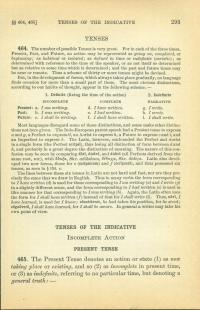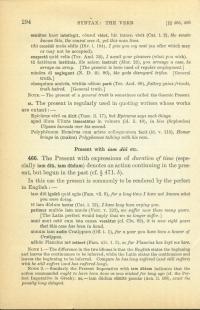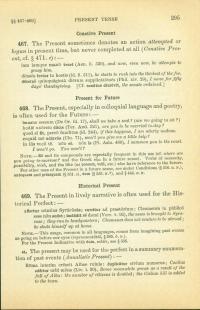465. The present tense denotes an action or state (1) as now taking place or existing, and so (2) as incomplete in present time, or (3) as indefinite, referring to no particular time, but denoting a general truth.
Senātus haec intellegit, cōnsul videt, hīc tamen vīvit. (Cat. 1.2)
The senate knows this, the consul sees it, yet this man lives.
Tibi concēdō meās sēdīs. (Div. 1.104)
I give you my seat.
(an offer which may or may not be accepted)
exspectō quid velīs (Ter. And. 34)
I await your pleasure (what you wish).
Tū āctiōnem īnstituis, ille aciem īnstruit. (Mur. 22)
You arrange a case, he arrays an army.
[The present is here used of regular employment.]
Minōra dī neglegunt. (N. D. 3.86)
the gods disregard trifles.
[General truth]
Obsequium amīcōs, vēritās odium parit. (Ter. And. 68)
Flattery gains friends, truth hatred.
[General truth]
Note— The present of a general truth is sometimes called the Gnomic Present.
a. The present is regularly used in quoting writers whose works are extant.
Epicūrus vērō ea dīcit. (Tusc. 2.17)
Epicurus says such things.
Apud illum Ulixēs lāmentāturin volnere (id. 2.49)
In him (Sophocles), Ulysses laments over his wound.
Polyphēmum Homērus cum ariete colloquentem facit. (id. 5.115)
Homer brings in (makes) Polyphemus talking with his ram.
466. The present with expressions of duration of time (especially iam diū, iam dūdum) denotes an action continuing in the present, but begun in the past (cf. § 471.b). In this use the present is commonly to be rendered by the perfect in English.
Iam diū īgnōrō quid agās. (Fam. 7.9)
For a long time I have not known what you were doing.
Tē iam dūdum hortor. (Cat. 1.12)
I have long been urging you.
Patimur multōs iam annōs. (Verr. 5.126)
We suffer now these many years.
[The Latin perfect would imply that We no longer suffer.]
Annī sunt octō cum ista causa versātur. (cf. Clu. 82)
it is now eight years that this case has been in hand.
Annum iam audīs Cratippum. (Off. 1.1)
For a year you have been a hearer of Cratippus.
Adhūc Plancius mē retinet. (Fam. 14.1.3)
So far Plancius has kept me here.
Note 1— The difference in the two idioms is that the English states the beginning and leaves the continuance to be inferred, while the Latin states the continuance and leaves the beginning to be inferred. Compare he has long suffered (and still suffers) with he still suffers (and has suffered long).
Note 2— Similarly the present imperative with iam dūdum indicates that the action commanded ought to have been done or was wished for long ago (cf. the perfect imperative in Greek).
Iam dūdum sūmite poenās. (Aen. 2.103)
Exact the penalty long delayed.
467. The present sometimes denotes an action attempted or begun in present time, but never completed at all (Conative Present, cf. § 471.c).
Iam iamque manū tenet. (Aen. 2.530)
And now, even now, he attempts to grasp him.
Dēnsōs fertur in hostīs. (id. 2.511)
He starts to rush into the thickest of the foe.
Dēcernō quīnquāgintā diērum supplicātiōnēs. (Phil. 14.29)
I move for fifty days' thanksgiving.
Cf. Senātus dēcrēvit.
The senate ordained.
468. The present, especially in colloquial language and poetry, is often used for the Future.
īmusne sessum? (De Or. 3.17)
Shall we take a seat?
(Are we going to sit?)
Hodiē uxōrem dūcis? (Ter. And. 321)
Are you to be married today?
Quod sī fit, pereō funditus (id. 244)
If this happens, I am utterly undone.
Ecquid mē adiuvās? (Clu. 71)
Won't you give me a little help?
In iūs vocō tē. Nōn eō. Nōn īs? (Pl. Asin. 480)
I summon you to the court. I won't go. You won't?
Note— Eō and its compounds are especially frequent in this use (cf. Where are you going to-morrow? and the Greek εἶμι in a future sense). Verbs of necessity, possibility, wish, and the like (as possum, volō, etc.) also have reference to the future.
For other uses of the Present in a future sense, see under Conditions (§ 516.a, Note), antequam and priusquam (§ 551.c), dum (§ 553, Note 2), and § 444.a, Note.
469. The present in lively narrative is often used for the Historical Perfect.
Affertur nūntius Syrācūsās; curritur ad praetōrium; Cleomenēs in pūblico esse nōn audet; inclūditsē domī. (Verr. 5.92)
The news is brought to Syracuse; they run to headquarters; Cleomenes does not venture to be abroad; he shuts himself up at home.
Note— This usage, common in all languages, comes from imagining past events as going on before our eyes (repraesentātiō, § 585.b.Note). For the present indicative with dum (while) see § 556.
a. The present may be used for the perfect in a summary enumeration of past events (Annalistic Present).
Rōma interim crēscit Albae ruīnīs: duplicātur cīvium numerus; Caelius additur urbī mōns. (Liv. 1.30)
Rome meanwhile grows as a result of the fall of Alba: the number of citizens is doubled; the Cœlian hill is added to the town.



